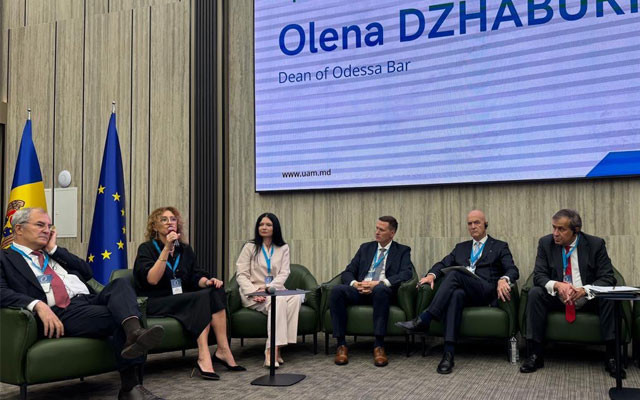
Pressure due to mobilization and criminal cases: who will protect advocates?

Martial law creates new challenges for advocacy: violations of professional rights have become systematic, with the most common forms of pressure being the mobilization of advocates while they are performing their professional duties and their prosecution as defendants in cases where they were acting as defense counsel.
This was stated by the acting chairman of the Odessa Regional Bar Council Olena Dzhaburia at the International Conference of the Bar Association of the Republic of Moldova on September 12 in Chisinau.
She recalled that the powers of the regional bar association, as defined by the relevant law, include promoting guarantees for the practice of advocate and protecting the professional and social rights of advocates, namely: the presence of representatives of the bar association during searches of an advocate's premises, responding to complaints about violations of guarantees for the practice of advocate, and so on.
A very common form of pressure exerted by law enforcement agencies on male advocates has been mobilization.
Although the justice system provides for deferment (when a person liable for military service is exempted from mobilization for a certain period of time so that he can continue to work at an enterprise or institution important to the state), this institution applies only to judges and prosecutors. Advocates are not protected from abuse. Therefore, people are detained simply while performing their professional duties, explained O. Dzhaburia. And even when the court finds a violation of mobilization procedures, unfortunately, there is a Supreme Court precedent that mobilization is irreversible.
As an example of pressure on advocates, the head of the Odessa advocacy cited the high-profile case of advocate Olga Panchenko, who defended five suspects in a case involving the creation of an illegal armed group. After a search, Panchenko was detained in the same case in which she was acting as a defense advocate.
This situation prompted an immediate response from the bar association. BCU held an emergency meeting and expressed its position on the inadmissibility of such actions by law enforcement agencies, and the head of the Odessa Regional Advocate Association filed a motion to release Panchenko on bail. Although the court of first instance chose to keep her in custody without alternative, the court of appeal changed the preventive measure and established an alternative of bail.
O. Dzhaburia also emphasized the urgent need for Ukraine to accede to the Council of Europe Convention on the protection of the profession of advocate as soon as possible, stressing that its signing would be crucial for strengthening guarantees of the independence of advocacy and ensuring the proper protection of advocates' rights in the context of contemporary challenges.
© 2025 Unba.org.ua Всі права захищені
"Національна Асоціація Адвокатів України". Передрук та інше використання матеріалів, що розміщені на даному веб-сайті дозволяється за умови посилання на джерело. Інтернет-видання та засоби масової інформації можуть використовувати матеріали сайту, розміщувати відео з офіційного веб-сайту Національної Асоціації Адвокатів України на власних веб-сторінках, за умови гіперпосилання на офіційний веб-сайт Національної Асоціації Адвокатів України. Заборонено передрук та використання матеріалів, у яких міститься посилання на інші інтернет-видання та засоби масової інформації. Матеріали позначені міткою "Реклама", публікуються на правах реклами.